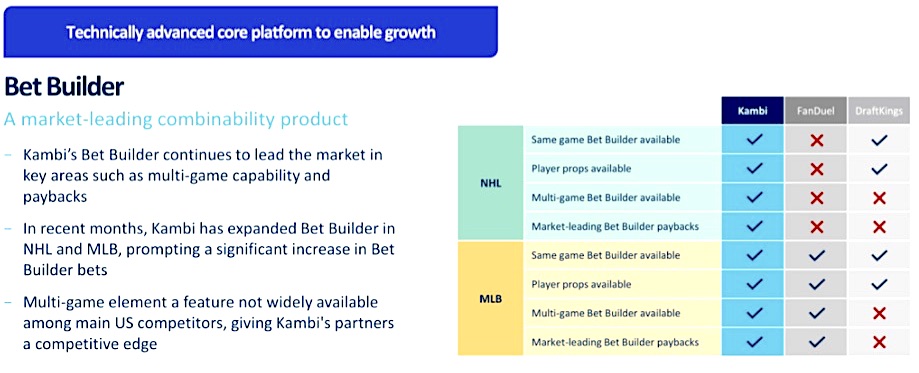Kambi’s latest quarterly results show the impact that big brands moving their tech stacks in-house is having on sports betting solutions providers. The group’s strategy to develop modular, API-powered solutions is a way to address the situation.
The 15% and 25% drops in revenue and turnover experienced by online sports betting solution provider Kambi is indicative of broader trends in the US market and, in particular, the moves by the sector’s biggest operators to focus their efforts on developing their own in-house tech stacks.
To an extent the Swedish betting technology provider is unlucky to be on the receiving end of that trend and, from its perspective, has found it difficult to counter the negative narrative that has surrounded the topic ever since DraftKings announced it would migrate to the SBTech platform.
Main brand absence
The DraftKings move happened around September 2021 and its impact can be seen from Kambi’s first quarter figures: turnover was down 25% (the amount was not disclosed), revenues dropped 15% to €36.9m and operating profit was down 61% to €7.3m on an annual basis, while Kambi CFO David Kenyon said DraftKings contributed 40% of its Q1 turnover in 2021.
Clarification: we’ve been told $DKNG represented 40% of @KambiSports‘ turnover in Q121, although the group doesn’t disclose actual turnover figures.
— Wagers.com Earnings+More (@earnings_and) April 27, 2022
Equally, the group said “operator turnover was up 25%” in Q1 if one discounts DraftKings’ migration and this “proves the underlying financial performance of the business remains strong”.
Kambi added that the turnover growth had been driven by the Super Bowl and March Madness and happened “despite being up against tough Q1 2021 comparatives and the temporary impact of regulatory headwinds in the Netherlands, which we expect to ease soon”.
As mentioned, Kambi is unlucky in that it is suffering from its two biggest clients wanting to do everything themselves. Barstool Sportsbook will migrate to theScore BET’s in-house platform in the coming months; and the attention and questions Kambi is receiving as a result can not be easy.
Mitigation strategy
To mitigate against those high profile departures, Kambi has signed a number of new clients, these include NorthStar Gaming, MaximBet and the Saginaw Chippewa tribe that operates Michigan’s Soaring Eagle Casino & Resort. It has also launched with Rush Street Interactive, Unibet and LeoVegas in Ontario and can boast of having Rush Street Interactive as its biggest client now.
There are caveats to these developments however, and the obvious observation to make is that none of existing or new clients will compensate for losing DraftKings and, at some point in the coming months, Barstool Sportsbook.
Modular flexibility
One industry observer commented on social media that Kambi should be credited for redirecting its efforts towards providing operators with a modular, API-led offering. The new product should give it more flexibility when it comes to signing clients, especially if they don’t want a full turnkey solution.
We should not underestimate how courageous it is for $KAMBI to reinvent its biz model.
The platform MTS won’t work in the US. Developing a modular approach to the US mkt is a must. The US has a different power constellation than Europe (5 power leagues vs 80+).@earnings_and https://t.co/1gVT2gNe1y
— QuantCappers (@QuantCappers) April 27, 2022
In terms of timings, Kambi CEO Kristian Nylen said it should be ready by early 2023, although he added that it mustn’t in any way cannibalize or devalue the quality of the group’s turnkey solution.
The group has also expanded its Bet Builder coverage to the NHL and MLB and said it would have NBA bets ready for the start of next season.

In-house vs. outsourced
Returning to the issue of in-house vs. outsourced technology platforms, Kambi’s current main client Rush Street Interactive is showing that it is possible to perform well in the US with a third party platform.
However, while RSI operates a Kambi-powered online sportsbook, its main vertical is online casino and as the analyst team at Wells Fargo has pointed out, as sports seasonality approaches, its GGR mix is likely to edge towards icasino, where it has shown resilience with around 25% market share in Pennsylvania and around 7% in New Jersey and Michigan.
In addition, RSI owns its online casino/igaming tech stack and, referencing the Boyd-Pala Interactive deal, Wells Fargo said this gave it “scarcity value given the evolving digital gaming ecosystem”.
Unsurprisingly, for Kambi boss Nylen the outlook is positive and European operators are looking “at what they have in-house and they struggle to keep up with competitors”.
“For that reason we’re very positive about the future. The market has (also) become less competitive now than a few years ago, especially with SBTech disappearing as B2B suppliers. There will be new entrants, but we have a unique position as a top tier supplier.”
In the US however, Kambi’s redirect and new modular focus is a sign that it is addressing a market that is developing with leaders that have most of their tech stack in-house and smaller operators likely to look for ‘lighter’ B2B sports betting offerings.
